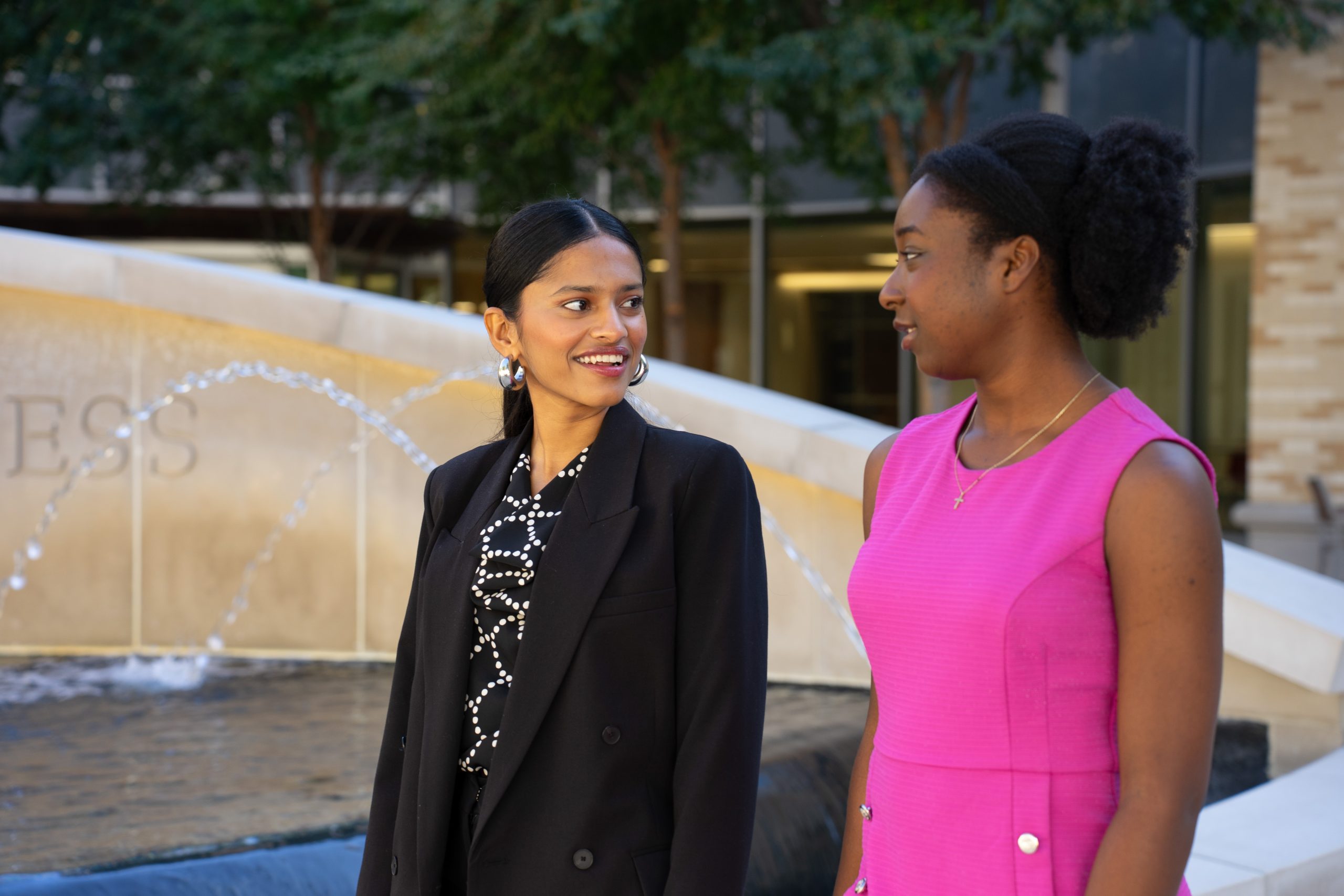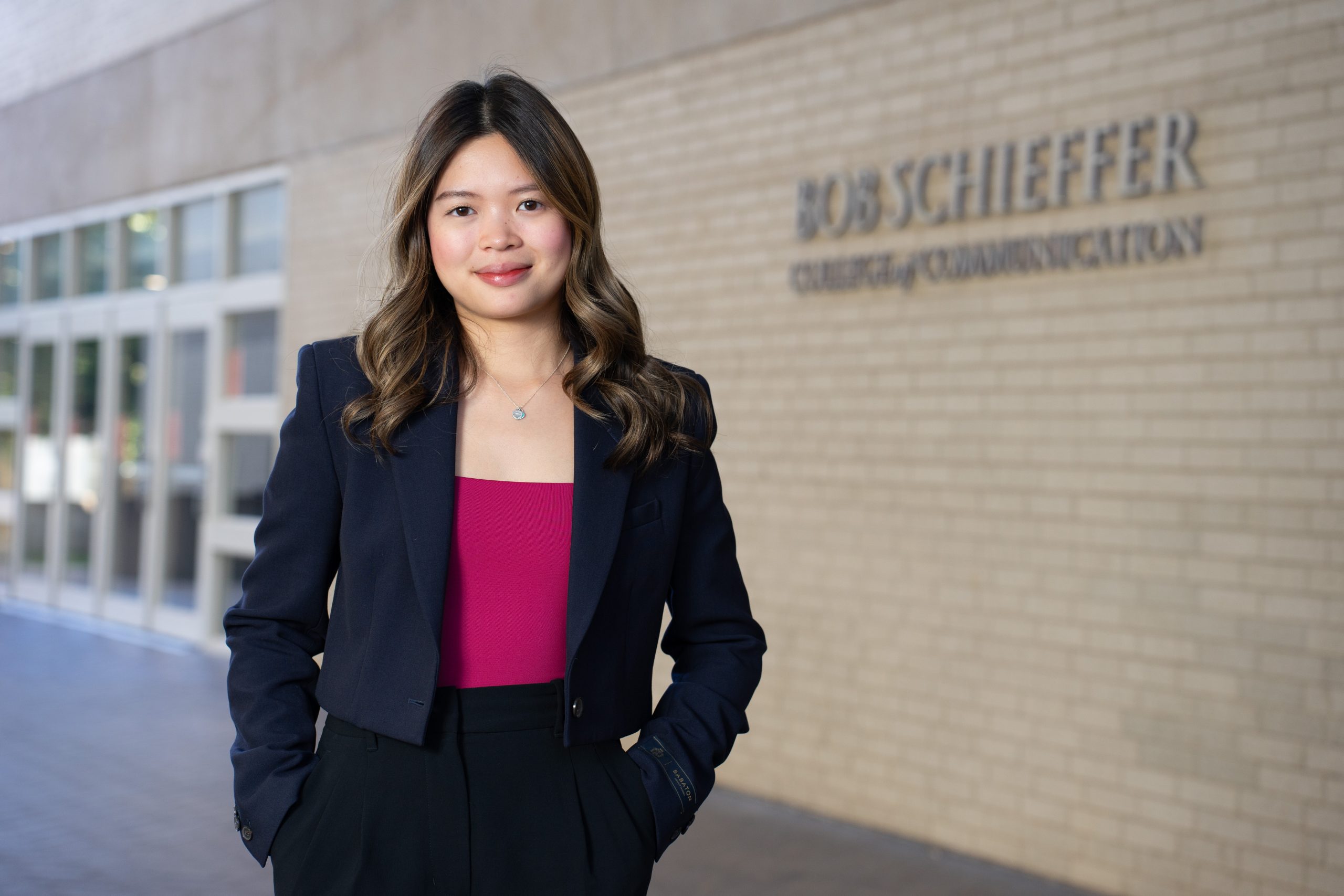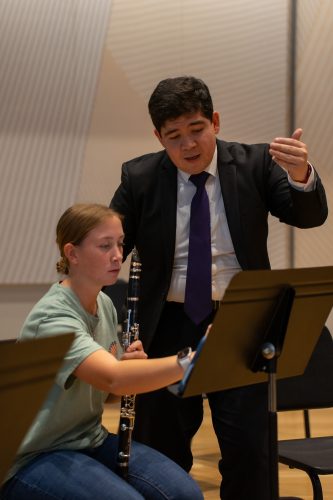
In fall 2024, 663 international students from 86 countries enrolled at TCU. Cienpies | iStock
World of Knowledge
International students find challenges and joys in U.S. college life.
Last August, TCU kicked off orientation for international students with Football 101, an event that teaches new-to-the-U.S. first-year students about American football. From throwing a football inside the Sam Baugh Indoor Practice Facility to kicking a field goal on the outdoor practice field, more than 100 international students got hands-on experience with the game.
In the fall, TCU served 762 international students from 93 countries. Vietnam sends the most students to TCU — currently 157. Other countries, including Tunisia and New Zealand, have a lone representative.
While college football culture is an undeniable draw, international students said they feel pulled to TCU for reasons academic, artistic and athletic.
FINDING TCU
Cecilia Le, a senior from Hanoi, Vietnam, first became interested in attending journalism school in the U.S. after watching election coverage in 2016 and witnessing a free press in action. A college counselor suggested TCU, which met Le’s desire for a strong journalism school; a generous financial package convinced her family.
Diego Torres Reyes ’21 MM from Bogotá, Colombia, now a clarinet performance doctoral student, met Germán Augusto Gutiérrez, professor of orchestral studies, through a Colombian youth orchestra. The personal connection, along with the promise of new musical perspectives and top-notch performance venues, caught his interest. Torres Reyes landed a graduate assistantship at TCU, which included a full-tuition scholarship and a campus job.
And in Borsad, a small town in Gujarat, India, Afrin Shekh attended an English-language high school and dreamed of studying business in the U.S. — even though in her community, girls don’t go to college. “Ever since I was young, I was very rebellious,” she said, describing how she would question traditions such as men eating before women, and men being the only ones to pursue higher education. “I really wanted to make that change.”
Shekh’s parents were “extremely supportive” of her ambitions, she said. A combination of scholarships and grants made her U.S. education possible. Today, the first-generation college student is a junior finance and business information systems major in the Neeley School of Business.

Afrin Shekh, left, came to TCU from a small town in India. Through her work with Neeley Fellows, she has made friends with student leaders like Anaya White.
In addition to meeting TCU’s academic admission requirements, international students must demonstrate English proficiency — a bar that has risen since TCU discontinued the Intensive English Program that once allowed conditional admission and language instruction. Prospective students must also pass an interview with a U.S. consulate and obtain a U.S. student visa.
“You might be the first one in your family to come to the United States, to go to school in the U.S., and you’re navigating this by yourself,” said Nicole Sinclair ’23, associate director of international admission. “It can be really intimidating.”
GETTING ACCLIMATED
For Le, Torres Reyes and Shekh, landing in Texas before orientation marked their first time stepping foot in the U.S. Orientation for international students includes more than the primer on football; most critical is learning how to properly maintain a student visa.
“If an international student is not enrolled full time each semester, that is a violation of their immigration status,” said Joshua Kai, director of International Services, whose office works to prevent such outcomes.
Orientation also covers employment, health insurance, financial literacy and housing.
“Many international students don’t know what a copay for insurance is or where they are covered or not covered,” Kai said. Mental health services, he added, are still stigmatized in many countries. “We want to make sure students understand that it’s OK to ask for help if you need it,” and that TCU has the resources available on campus.
To conclude orientation, international undergraduates attend the last Frog Camp, Challenge B, in Waxahachie, Texas. For Le, who grew up on the 35th floor of a skyscraper in Hanoi, the three-day camp with Grimy Games and toasting marshmallows by the campfire was entirely new.

Cecilia Le, from Hanoi, Vietnam, experienced culture shock in her early days at TCU. The now senior found her footing and made friends across campus.
But the culture shock began days earlier, on her ride from the airport to Fort Worth. Having grown up watching American movies set in New York City, she expected a more urban landscape.
“Fort Worth looks exactly like my grandparents’ hometown,” she said, “which is countryside.”
Sinclair volunteered at Frog Camp one year and remembered an international student who asked her, in the buffet line, what a corn dog was. “I was like, ‘Well, it’s a hot dog that’s rolled in batter and fried,’ ” Sinclair said. “And then she said, ‘What’s a hot dog?’ ”
Shekh suffered from gut issues in her early days in Texas; she had never eaten processed food. The affluence on campus was an adjustment, too. “Some things that are considered luxuries in the community that I’m from,” she said, “are basic necessities here.”
For Torres Reyes, the biggest obstacles were the August heat — Bogotá’s days linger in the 70s year-round — and trying to process English 24/7. “I have been learning English since I was 8 years old,” he said. “I could write it, I could understand it, but when I had to speak it, it took me a while to get used to it.”
The expectation to ask questions in class and use office hours for one-on-one help can present cultural challenges for some international students, who might see those practices as disrespectful to their professor.
“A lot of these students are coming from countries where their learning environment is very different,” Sinclair said. “The teacher teaches, and you sit and you learn.”
FINDING COMMUNITY
The International Student Association helps new students connect to smaller groups — whether cultural, religious or interest-based — to find a sense of belonging.
Le joined the Vietnamese Student Association, which puts on an annual cultural show; she rehearsed for months to perform traditional Vietnamese dances. She said the experience helped her bond with other Vietnamese students.
College life got lonely for Le — the only journalism major from her country — during her sophomore year, as her Vietnamese friends at TCU moved on to classes in their majors. Gradually, Le found new friendships through journalism classes and working in student media. As a junior, she joined a sorority and grew closer to her American friends.

Diego Torres Reyes teaches clarinet lessons as he works toward a Doctor of Musical Arts degree.
“I’ve had the chance to visit their house and see how real Americans live, which is totally not New York life at all,” she said. “Without them, I wouldn’t have as great of a college experience.”
Shekh first found community in the South Asian Intercultural Association and the Muslim Student Association. She was selected for Neeley Fellows, an honors business program that promotes community impact. Even as she excelled, she struggled with impostor syndrome.
“It feels weird sometimes,” she said, “to be in the rooms where you never thought you would be.”
At first, school breaks — when other students leave and the dining halls close — were lonely times. Shekh, who has flown home to India only twice during her time at TCU, said that being invited to go home with friends, including the president of the Muslim Student Association whose family prepared Indian food, made a big difference.
Torres Reyes said he benefited from finding an instant community, as Gutiérrez has recruited some dozen Colombian students who currently study in the School of Music. “We feel very welcomed by Dr. Gutiérrez and his wife,” Torres Reyes said, describing how Silvia Gutiérrez ’00 MLA prepares Colombian food for the group. “They are always looking out for us and making sure that we are OK.”
INTERNSHIPS AND BEYOND
TCU hosts a variety of workshops — immigration, professional development and social — to help international students thrive. The office of International Services also provides support for up to three years postgraduation for international students who begin careers in the U.S.
“They have the option to apply for what’s called OPT, or optional practical training, and it gives them [work authorization for up to] 12 months, and TCU still sponsors them while they do that,” Kai said. “If they’re a STEM major, they can extend that for another 24 months.” After that, they must find alternative sponsorship or return home.
Working in the U.S. — even in an internship — can be tricky for people on a student visa. International students must find a company willing to fill out documents for them. As a junior, Le was offered a sought-after communications internship by a major local employer, which rescinded the offer upon finding out she was on a student visa.
“Having students who are from different backgrounds, different life experiences and different cultures that speak different languages only enhances the classroom conversation.”
Nicole Sinclair
Le then found a news internship with the CBS affiliate in Dallas. She said she was excited to be out in the field, where a reporter entrusted her with conducting interviews and collecting soundbites, which resulted in a résumé reel showcasing her work.
Shekh has avoided student visa limitations by working on campus, currently as an intern for TCU’s department of marketing and communication. She has also found meaning and a sense of belonging through her work as a student housing associate and culture connector. “To be able to be in a position where I can make you feel like you’re at home,” she said, “helps me feel at home.”
While Torres Reyes takes the occasional off-campus gig as a performer, he regularly works as a stage manager in the School of Music and as a graduate assistant to Corey Mackey, an assistant professor of clarinet. Mackey has offered Torres Reyes opportunities to teach private lessons as well as the woodwind methods class that future band directors take. Such teaching experiences, Torres Reyes said, will help him reach his goal of becoming a music professor.
Sinclair has witnessed the positive impacts international students and their American classmates make on one another. She remembered a student from India who shared a dorm room with a student from Oklahoma; the women became friends and visited each other’s homes.
“The student from India got to ride a horse and got a pair of cowboy boots and sent me all of these cute pictures,” Sinclair said. “And then that summer, the student from Oklahoma went to India and stayed with that student and her family for a couple of weeks.
“That’s actually part of our mission statement — to educate [responsible citizens in] the global community,” Sinclair said. “Having students who are from different backgrounds, different life experiences and different cultures that speak different languages only enhances the classroom conversation.”

Your comments are welcome
Comments
Related reading:
Features
A Better World
Students speak out on their vision for the campus and beyond.
Campus News: Alma Matters
Beyond Borders
Business students think global.
Features
The World is Ours
TCU’s student-designed Intercultural Center helps promote belonging.